The annual Southern 80 blasts an energy into Echuca not seen here since ale houses and bordellos ruled.
The annual Southern 80 blasts an energy into Echuca not seen here since ale houses and bordellos ruled.
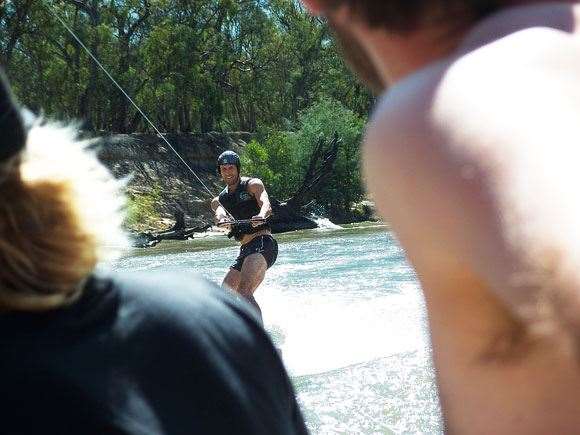 “Lean back and let the boat do the work” is easier than it sounds.
“Lean back and let the boat do the work” is easier than it sounds.Images: Sarah Morton, NSW Tourism
Back in the days when Queen Victoria was still a comely young thing, Echuca was the biggest, loudest, wildest river port in Australia. Neatly positioned where ol’ man Murray dips closest to Melbourne, the place fizzed with industrious energy as fleets of low-slung paddle steamers, their decks sagging beneath bales of wool and wheat, converged on the town’s 300m-long red gum wharf. And, like any good port town, the place also fizzed with a seamier energy. It was estimated there were over 100 pubs in town, and no one even bothered to guess how many illegal gambling houses and bordellos were crammed into the warren of sandstone tunnels that branched from the cellars of the pubs like a sordid ants nest. Yes sir, back in those sepia days, Echuca hummed.
And then the railway was built from Junee to Hay and the fledgling economy stumbled and Echuca shrivelled like a dying spider. The banks locked their doors and the paddle steamers dropped anchor. As the industry went, so did the fun. The pubs boarded their windows and the tunnels were abandoned. No doubt an army of pallid prostitutes and croupiers emerged blinking into the sun before scuttling off to the next boom town.
But something of that raffish air remains in Echuca, and its outlet isn’t drunkenness, card playing or whoring (although, no doubt a dash of those three remains). These days the outlet involves strapping yourself to a metre-and-a-half plank of wood and hurtling down the river behind boats that look like bullets and carry engines the size of kitchen fridges. Dare we suggest it makes a spot of illegal howdy-do in a dank tunnel look positively boring? At least that’s what Echuca local and three-time barefoot waterskiing world champ Brett Sands is out to prove when he hauls me behind his 450-horsepower missile (although, in fairness, Sands provided no tunnel hanky-panky for the purposes of comparison) …
If you read the papers, with all their sombre eulogising of the Murray-Darling Basin, you could be excused for thinking the Murray is no more than a straggle of fetid puddles steaming hopelessly beneath the burning sun. Around Echuca, at least, nothing could be further from the truth. Here, the river keeps on rolling, wide and brown, glistening happily in the relentless summer glare. And this is a good thing for those with speedboats and wakeboards because this tract of river is wakeboarding nirvana. With its curlicued line, steep banks and bracketing forests of eucalypts, the river’s sinuously challenging, while the water’s smooth as honey. No matter which direction the wind whistles, no matter how hard it blows, you can always scout out a clean stretch of water around Echuca.
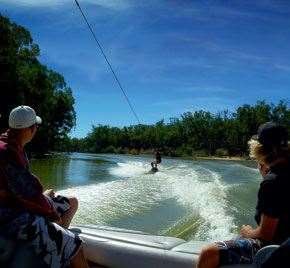 After a few face- plants into the Murray, your author’s away
After a few face- plants into the Murray, your author’s awayImages: Sarah Morton, NSW Tourism
It’s for this reason that 100,000 adrenalin-hungry pilgrims descend on the town each year to watch the world’s largest waterski race, the Southern 80. The design of the race is simple: 80km long, 126 bends, quickest time wins. Back in ’71, the winning time was a tick under 57 minutes. This year’s winner did it in half an hour. Do the maths on that and you’ll realise these blokes are really moving. And yes, it’s as precarious as it sounds – in the past five years three racers have died. Last year, 43-year-old Melbournian Tim Driver hit the water with such force his heart simply gave up the ghost. The medics never stood a chance. The next morning the crowds held a minute’s silence for their fallen comrade, then sat down to watch a day of carnage where seven more skiers left the river in the back of an ambulance.
And on this afternoon, as Sands and I shoot down the river in his boat, I can’t help but note a small shrine – a faded Australian flag pinned above a posy of pink flowers – erected on the edge of the river. Nestled amidst the bony trunks of fallen eucalypts, it’s a dark and lonely sight.Sands first competed in the Southern 80 when he was 11; since then he’s braved a handful of appearances. I ask him about the race, about the adrenaline, the fear. He has a hard block of jaw and thin slit of mouth not given to elaboration. “Mate, it’s pretty hairy,” he drawls over the thunder of the engine. “You just hold on.”
Just hold on: it’s salient advice for a novice skier. Firstly, it’s wisdom born of the fact that letting go and hitting the water, even at modest speeds, is an uncomfortable experience. After face-planting on my second attempt, then stubbornly white-knuckling the handle, I simultaneously receive a bullock kick to the face and a gallon of river water to the belly. Secondly, it’s wisdom born of the fact that, once you’re up and standing, holding on to the handle should be the most strenuous aspect of skiing. As Sands repeats, over and over while I’m on the water (he has a rather nifty radio hook-up built into the carbon fibre helmets the skiers must wear), the key is to relax your arms and soften your legs. “Lean back,” he says, “and let the boat do the work.” It’s easier than it sounds. As the boat picks up speed my shoulders, arms, hips, quads seize hard against the movement, fighting the boat with all my strength. Within a few minutes my body is burning with lactic acid.
But when I finally grasp the concept of working with the engine, when I stop trying to halt the pull of 450 horses with flexed arms and clenched buttocks, there’s an almost ecstatic ease to coasting down the ancient river while the grey gums and parched banks tear past. Hell, I don’t even notice the sombre little shrine when it whips by. It’s an ecstasy, I imagine, that must seem almost transcendental during the Southern 80, when you’re pushing 160km/h and the banks of the river blur to a grey smear and the cheers of the crowd are drowned-out by the scream of the engine. On the other hand, it’s an ecstatic ease, I guess, that was no doubt missed by the whiskered deckhands on the old paddle steamers who had nothing but a quart of gritty home brew, a spot of card playing and a hard bed in a cold tunnel to look forward to.
– Aaron Scott
Related Articles
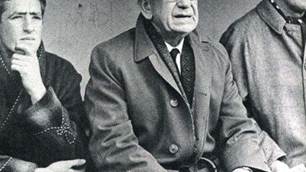
Before Barassi, there was Frank "Checker" Hughes
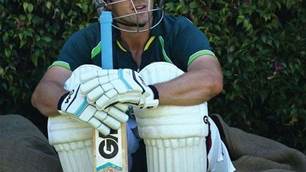
Will our Olympians bounce back at this year's Games?
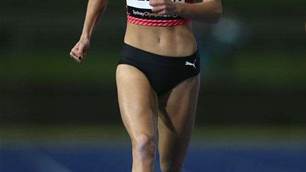

.png&h=115&w=225&c=1&s=1)










